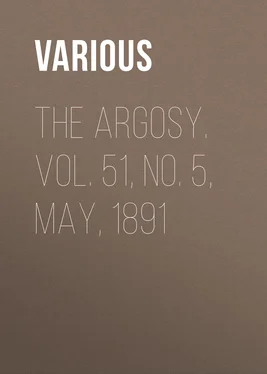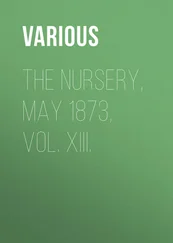Various - The Argosy. Vol. 51, No. 5, May, 1891
Здесь есть возможность читать онлайн «Various - The Argosy. Vol. 51, No. 5, May, 1891» — ознакомительный отрывок электронной книги совершенно бесплатно, а после прочтения отрывка купить полную версию. В некоторых случаях можно слушать аудио, скачать через торрент в формате fb2 и присутствует краткое содержание. Жанр: foreign_antique, periodic, foreign_edu, на английском языке. Описание произведения, (предисловие) а так же отзывы посетителей доступны на портале библиотеки ЛибКат.
- Название:The Argosy. Vol. 51, No. 5, May, 1891
- Автор:
- Жанр:
- Год:неизвестен
- ISBN:нет данных
- Рейтинг книги:5 / 5. Голосов: 1
-
Избранное:Добавить в избранное
- Отзывы:
-
Ваша оценка:
- 100
- 1
- 2
- 3
- 4
- 5
The Argosy. Vol. 51, No. 5, May, 1891: краткое содержание, описание и аннотация
Предлагаем к чтению аннотацию, описание, краткое содержание или предисловие (зависит от того, что написал сам автор книги «The Argosy. Vol. 51, No. 5, May, 1891»). Если вы не нашли необходимую информацию о книге — напишите в комментариях, мы постараемся отыскать её.
The Argosy. Vol. 51, No. 5, May, 1891 — читать онлайн ознакомительный отрывок
Ниже представлен текст книги, разбитый по страницам. Система сохранения места последней прочитанной страницы, позволяет с удобством читать онлайн бесплатно книгу «The Argosy. Vol. 51, No. 5, May, 1891», без необходимости каждый раз заново искать на чём Вы остановились. Поставьте закладку, и сможете в любой момент перейти на страницу, на которой закончили чтение.
Интервал:
Закладка:
Various
The Argosy / Vol. 51, No. 5, May, 1891
THE FATE OF THE HARA DIAMOND
CHAPTER XVIII
On entering Lady Chillington's room for the second time, Janet found that the mistress of Deepley Walls had completed her toilette in the interim, and was now sitting robed in stiff rustling silk, with an Indian fan in one hand and a curiously-chased vinaigrette in the other. She motioned with her fan to Janet. "Be seated," she said, in the iciest of tones; and Janet sat down on a chair a yard or two removed from her ladyship.
"Since you were here last, Miss Hope," she began, "I have seen Sister Agnes, who informs me that she has already given you an outline of the duties I shall require you to perform should you agree to accept the situation which ill-health obliges her to vacate. At the same time, I wish you clearly to understand that I do not consider you in any way bound by what I have done for you in the time gone by, neither would I have you in this matter run counter to your inclinations in the slightest degree. If you would prefer that a situation as governess should be obtained for you, say so without hesitation; and any small influence I may have shall be used ungrudgingly in your behalf. Should you agree to remain at Deepley Walls, your salary will be thirty guineas a-year. If you wish it, you can take a day for consideration, and let me have your decision in the morning."
Lady Chillington's mention of a fixed salary stung Janet to the quick: it was so entirely unexpected. It stung her, but only for a moment; the next she saw and gratefully recognised the fact that she should no longer be a pensioner on the bounty of Lady Chillington. A dependent she might be—a servant even, if you like; but at least she would be earning her living by the labour of her own hands; and even about the very thought of such a thing there was a sweet sense of independence that flushed her warmly through and through.
Her hesitation lasted but a moment, then she spoke. "Your ladyship is very kind, but I require no time for consideration," she said. "I have already made up my mind to take the position which you have so generously offered me; and if my ability to please you only prove equal to my inclination, you will not have much cause to complain."
A faint smile of something like satisfaction flitted across Lady Chillington's face. "Very good, Miss Hope," she said, in a more gracious tone than she had yet used. "I am pleased to find that you have taken so sensible a view of the matter, and that you understand so thoroughly your position under my roof. How soon shall you be prepared to begin your new duties?"
"I am ready at this moment."
"Come to me an hour hence, and I will then instruct you."
In this second interview, brief though it was, Janet could not avoid being struck by Lady Chillington's stately dignity of manner. Her tone and style were those of a high-bred gentlewoman. It seemed scarcely possible that she and the querulous, shrivelled-up old woman in the cashmere dressing-robe could be one and the same individual.
Unhappily, as Janet to her cost was not long in finding out, her ladyship's querulous moods were much more frequent than her moods of quiet dignity. At such times she was very difficult to please; sometimes, indeed, it was utterly impossible to please her: not even an angel could have done it. Then, indeed, Janet felt her duty weigh very hardly upon her. By nature her temper was quick and passionate—her impulses high and generous; but when Lady Chillington was in her worse moods, she had to curb the former as with an iron chain; while the latter were outraged continually by Lady Chillington's mean and miserly mode of life, and by a certain low and sordid tone of thought which at such times pervaded all she said and did. And yet, strange to say, she had rare fits of generosity and goodwill—times when her soul seemed to sit in sackcloth and ashes, as if in repentance for those other occasions when the "dark fit" was on her, and the things of this world claimed her too entirely as their own.
After her second interview with Lady Chillington, Janet at once hurried off to Sister Agnes to tell her the news. "On one point only, so far as I see at present, shall I require any special information," she said. "I shall need to know exactly the mode of procedure necessary to be observed when I pay my midnight visits to Sir John Chillington."
"It is not my intention that you should visit Sir John," said Sister Agnes. "That portion of my old duties will continue to be performed by me."
"Not until you are stronger—not until your health is better than it is now," said Janet earnestly. "I am young and strong; it is merely a part of what I have undertaken to do, and you must please let me do it. I have outgrown my childish fears, and could visit the Black Room now without the quiver of a nerve."
"You think so by daylight, but wait until the house is dark and silent, and then say the same conscientiously, if you can do so."
But Janet was determined not to yield the point, nor could Sister Agnes move her from her decision. Ultimately a compromise was entered into by which it was agreed that for one evening at least they should visit the Black Room together, and that the settlement of the question should be left until the following day.
Precisely as midnight struck they set out together up the wide, old-fashioned staircase, past the door of Janet's old room, up the narrower staircase beyond, until the streak of light came into view and the grim, nail-studded door itself was reached. Janet was secretly glad that she was not there alone; so much she acknowledged to herself as they halted for a moment while Sister Agnes unlocked the door. But when the latter asked her if she were not afraid, if she would not much rather be snug in bed, Janet only said: "Give me the key; tell me what I have to do inside the room, and then leave me."
But Sister Agnes would not consent to that, and they entered the room together. Instead of seven years, it seemed to Janet only seven hours since she had been there last, so vividly was the recollection of her first visit still impressed upon her mind. Everything was unchanged in that chamber of the dead, except, perhaps, the sprawling cupids on the ceiling, which looked a shade dingier than of old, and more in need of soap and water than ever. But the black draperies on the walls, the huge candles in the silver tripods, the pall-covered coffin in the middle of the room, were all as Janet had seen them last. There, too, was the oaken prie-dieu a yard or two away from the head of the coffin. Sister Agnes knelt on it for a few moments, and bent her head in silent prayer.
"My visit to this room every midnight," said Sister Agnes, "is made for the simple purpose of renewing the candles, and of seeing that everything is as it should be. That the visit should be made at midnight, and at no other time, is one of Lady Chillington's whims—a whim that by process of time has crystallised into a law. The room is never entered by day."
"Was it whim or madness that caused Sir John Chillington to leave orders that his body should be kept above ground for twenty years?"
"Who shall tell by what motive he was influenced when he had that particular clause inserted in his will? Deepley Walls itself hangs on the proper fulfilment of the clause. If Lady Chillington were to cause her husband's remains to be interred in the family vault before the expiry of the twenty years, the very day she did so the estate would pass from her to the present baronet, a distant cousin, between whom and her ladyship there has been a bitter feud of many years' standing. Although Deepley Walls has been in the family for a hundred and fifty years, it has never been entailed.
Читать дальшеИнтервал:
Закладка:
Похожие книги на «The Argosy. Vol. 51, No. 5, May, 1891»
Представляем Вашему вниманию похожие книги на «The Argosy. Vol. 51, No. 5, May, 1891» списком для выбора. Мы отобрали схожую по названию и смыслу литературу в надежде предоставить читателям больше вариантов отыскать новые, интересные, ещё непрочитанные произведения.
Обсуждение, отзывы о книге «The Argosy. Vol. 51, No. 5, May, 1891» и просто собственные мнения читателей. Оставьте ваши комментарии, напишите, что Вы думаете о произведении, его смысле или главных героях. Укажите что конкретно понравилось, а что нет, и почему Вы так считаете.












